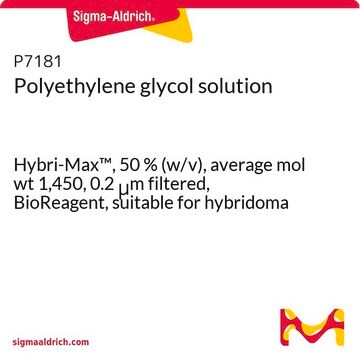W331201
3-(Methylthio)propyl isothiocyanate
≥98%, FG
Sinónimos:
radish isothiocyanate
About This Item
Halal
Kosher
Productos recomendados
biological source
synthetic
Quality Level
grade
FG
Halal
Kosher
agency
meets purity specifications of JECFA
reg. compliance
EU Regulation 1334/2008 & 178/2002
assay
≥98%
refractive index
n20/D 1.564 (lit.)
bp
254 °C (lit.)
density
1.102 g/mL at 25 °C (lit.)
application(s)
flavors and fragrances
documentation
see Safety & Documentation for available documents
food allergen
no known allergens
organoleptic
pungent; vegetable; sulfurous
SMILES string
CSCCCN=C=S
InChI
1S/C5H9NS2/c1-8-4-2-3-6-5-7/h2-4H2,1H3
InChI key
LDKSCZJUIURGMW-UHFFFAOYSA-N
¿Está buscando productos similares? Visita Guía de comparación de productos
Application
- Functional Chitosan-Based Composite Film Incorporated with 3-(Methylthio) Propyl Isothiocyanate/α-Cyclodextrin Inclusion Complex for Chicken Meat Preservation.: This study explores the development of a functional composite film based on chitosan and incorporating 3-(methylthio) propyl isothiocyanate within an α-cyclodextrin inclusion complex. The composite film demonstrates significant antimicrobial properties, making it highly effective for chicken meat preservation, thereby extending the shelf life and maintaining the quality of meat products (Wu et al., 2022).
signalword
Danger
Hazard Classifications
Acute Tox. 3 Dermal - Acute Tox. 3 Inhalation - Acute Tox. 3 Oral - Aquatic Acute 1 - Aquatic Chronic 1 - Eye Irrit. 2 - Skin Irrit. 2 - STOT SE 3
target_organs
Respiratory system
Storage Class
6.1C - Combustible acute toxic Cat.3 / toxic compounds or compounds which causing chronic effects
wgk_germany
WGK 3
flash_point_f
187.9 °F
flash_point_c
86.6 °C
Elija entre una de las versiones más recientes:
¿Ya tiene este producto?
Encuentre la documentación para los productos que ha comprado recientemente en la Biblioteca de documentos.
Nuestro equipo de científicos tiene experiencia en todas las áreas de investigación: Ciencias de la vida, Ciencia de los materiales, Síntesis química, Cromatografía, Analítica y muchas otras.
Póngase en contacto con el Servicio técnico







